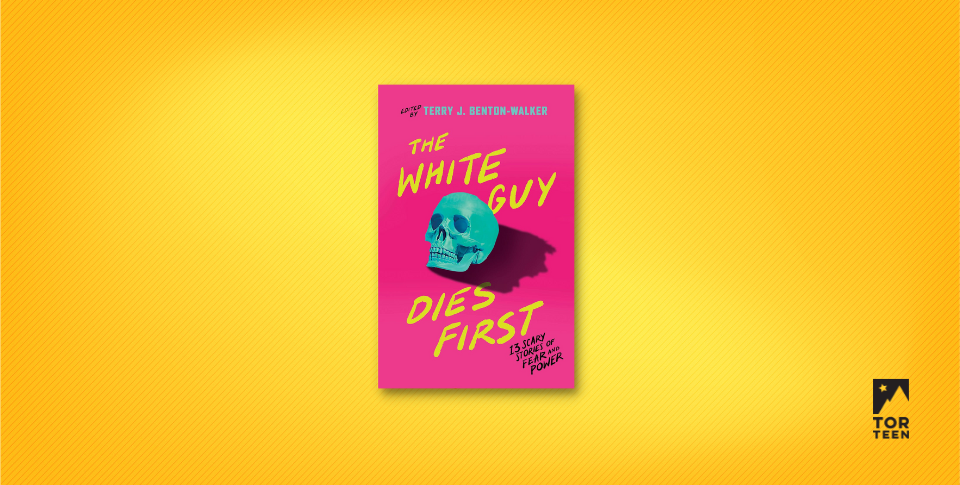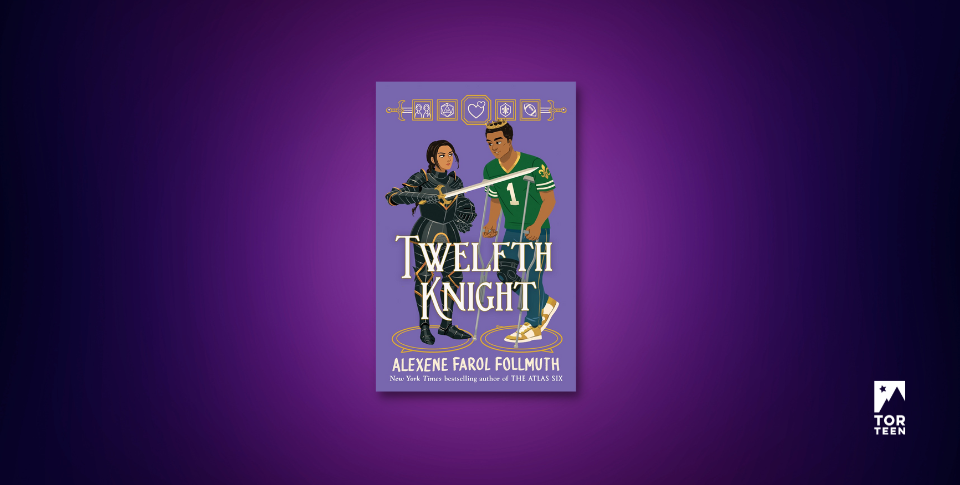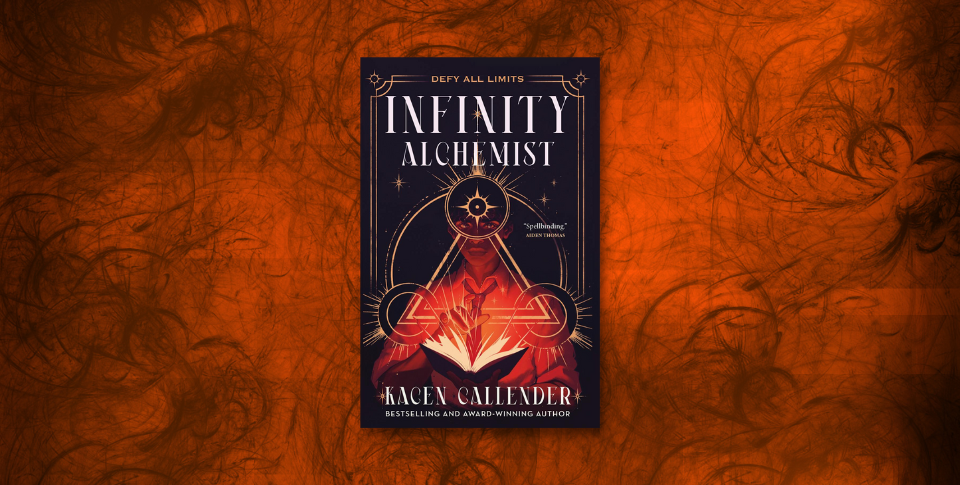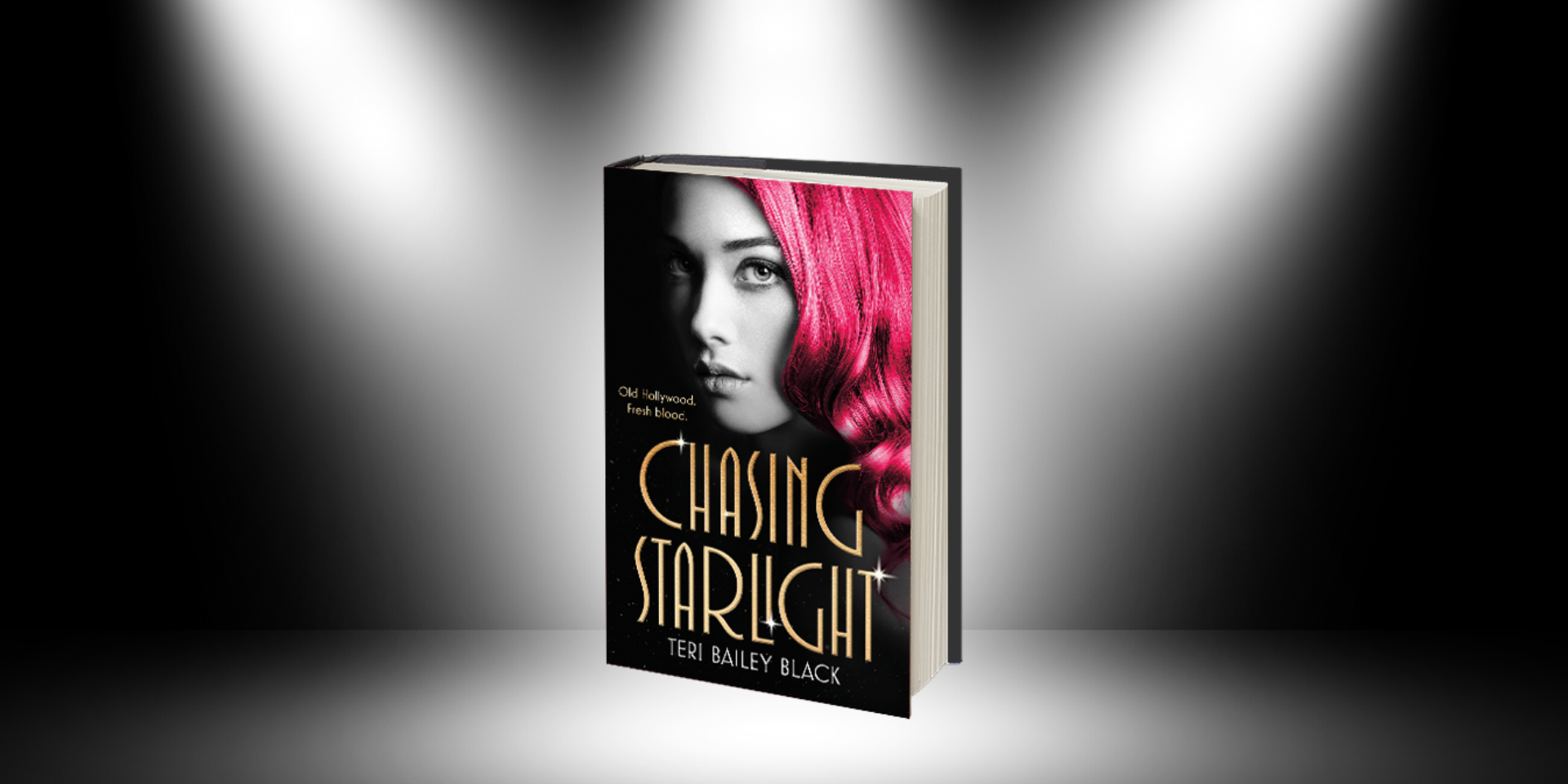
Teri Bailey Black, the Thriller Award-winning author of Girl at the Grave, makes her grand return to YA with Chasing Starlight a new historical mystery set during the Golden Age of Hollywood and brimming with movies, mansions, and murder. A cozy must-read for fans of La La Land and Knives Out.
1938. The Golden Age of Hollywood. Palm trees and movie stars. Film studios pumping out musicals and gangster films at a furious pace. Everyone wants to be a star except society girl and aspiring astronomer Kate Hildebrand. She’s already famous after a childhood tragedy turned her into a newspaper headline. What she craves now is stability.
But when Kate has to move to Hollywood to live with her washed-up silent film star grandfather, she walks into a murder scene and finds herself on the front page again. She suspects one of the young men boarding in her grandfather’s run-down mansion is the killer or maybe even her grandfather.
Now, Kate must discover the killer while working on the set of a musical and falling in love. Will her stars align so she can catch the murderer and live the dream in Old Hollywood? Or will she find that she’s just chasing starlight?
Read an excerpt of Chasing Starlight coming August 11th.
Chapter 1
1938 California
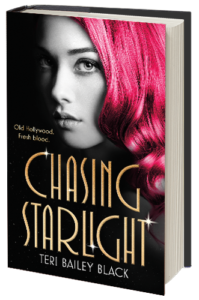 [dropcap type=”circle”]W[/dropcap]hen Kate Hildebrand had pictured stepping off the train in Hollywood, she’d imagined palm trees and sunshine, not this inky-black night and strange, warm wind. A loose sign banged in the restless air and leaves rustled.
[dropcap type=”circle”]W[/dropcap]hen Kate Hildebrand had pictured stepping off the train in Hollywood, she’d imagined palm trees and sunshine, not this inky-black night and strange, warm wind. A loose sign banged in the restless air and leaves rustled.
She stood in the shaft of light spilling from the train, her heart thumping harder than it should have, wishing she’d taken an earlier train to arrive in daylight.
Kate hated the dark.
Behind her, the Santa Fe Super Chief screamed a warning whistle and chugged into motion, moving on to San Diego. In front of her, the other teenaged girl who’d disembarked was greeted by a large family, everyone hugging and talking at once, and the man who’d dozed most of the day dropped his suitcase to embrace a woman holding a baby. Farther away, a cluster of men in suits and hats shook hands.
No one approached Kate.
She lifted her chin to see better below the brim of her stylish blue fedora, but didn’t find her grandfather.
Not that his face was all that familiar to her.
He’d come to San Francisco for Thanksgiving when Kate was eight an attempt at reconciliation with her mother that hadn’t gone so well and he’d returned for her mother’s funeral a few years after that, but Kate hadn’t seen him because she hadn’t attended. Since then, there’d been a few birthday cards and awkward phone calls, but Kate knew more about her grandfather from movie magazines than memories, and those magazines were a decade old, from his heyday in the 1920s.
No one had written about silent film star Oliver Banks in a very long time.
The station wasn’t as grand as she’d expected, just a wide stretch of concrete with a stucco building and two lanterns casting more shadow than light. No movie stars arriving to swarms of fans, like she’d seen in magazines. But then, this wasn’t actually Hollywood, just the neighboring town where her grandfather lived Pasadena.
The other travelers drifted into the dark, taking their cheerful voices with them, leaving Kate alone with her luggage two enormous trunks, a small suitcase, a cosmetic case, and three hat boxes. Her entire life packed into a few square feet of space.
“He’s expecting you,” Aunt Lorna had insisted yesterday as she’d packed for her own trip in another direction which for Aunt Lorna meant tossing clothes on the bed for their housekeeper Hattie to pack. “I sent a telegram and it’s all set. I hope you’ve finished packing.”
“You know I have.” Lists written. Tasks crossed off. Everything Kate owned neatly folded and organized, her telescope tucked between sweaters.
“Which outfit for boarding the ship?” Aunt Lorna had asked. “Something pretty?” She’d held up an apricot-colored dress. “Or the expected nautical?” In her other hand, she’d held up navy with gold buttons.
“Nautical,” Kate had advised without much thought because Aunt Lorna looked chic in everything. She had the same lean figure as all the Hildebrands including Kate and the same red hair, cut chin length, carefully curled and tucked into place. Aunt Lorna’s shade was bright copper, helped by a bottle; Kate’s, auburn.
Aunt Lorna had held up a fox stole, the engagement ring on her left hand sparkling like a block of ice. “What does one wear in South America, do you think?”
“Safari hats, I should guess.” “How ghastly.”
Kate had dropped to the sofa under the window, stretching out her long legs. “What if I despise Hollywood?”
“Oh, darling, how could you possibly despise Hollywood? All those movie stars and pool parties.”
“I doubt my grandfather dines with Cary Grant. His friends will all be ancient.” She’d hesitated before asking, “Can I come back if I hate it?”
Aunt Lorna had given her a sideways look. “You’ve burned that bridge, I’m afraid.” Two weeks ago, her fiancé had found Kate’s list of Seven Reasons for Not Marrying Mr. Norton, and his requirement that Kate not live with them after the wedding had become nonnegotiable. “Besides,” Aunt Lorna said in a gentler tone. “You don’t want to live with him any more than he wants to live with you.”
No, Kate didn’t want to live with Mr. Norton, who insisted on eating in silence to aid his digestion. But she didn’t want to leave home either. “I’m the first girl to ever be president of the astronomy club, and I’m leaving before I even get started. I’m going to miss the yacht club dance next week. And Meg’s birthday party. I just wish you’d waited until I was done with high school to get married.”
“Sadly, wishes don’t pay the butcher.”
“Or the housekeeper,” Hattie muttered, stuffing newspaper into the toes of glittering party shoes.
Uncle Harvey had died two years ago, but Aunt Lorna had never seemed to grasp the concept that continuing to spend lavishly without an income led to an empty bank account. She owed every dress shop in town, and poor Hattie hadn’t been paid in months. Mr. Norton and his gold-mining fortune had come along just in time. They would be married by the ship’s captain, and then spend a month in South America inspecting Mr. Norton’s gold mines his idea of a romantic honeymoon before returning to Aunt Lorna’s house in San Francisco. While they were away, the house would be gutted and remodeled, Kate’s bedroom turned into an office for Mr. Norton.
“Hattie, I want all the jewelry in my cosmetic case so I can keep it close on the ship,” Aunt Lorna said, holding up a strand of pearls. “And don’t forget about the movers tomorrow, putting everything in storage while the house is remodeled. And Kate’s car”
“Yes, ma’am, picked up by the new owners.” Tactful Hattie. She knew Kate’s car was being repossessed by the bank one debt Mr. Norton refused to pay.
Her darling little roadster gone. Her bedroom demolished. Even Aunt Lorna the closest thing she’d had to a mother in four years sailing away after a quick kiss at the train station that morning.
This was Kate’s new life. And no one to greet her.
She left her luggage on the platform and entered the small station, which was deserted except for an elderly man behind the counter. “If you’re going to San Diego, you missed it.”
“I just arrived. I was expecting someone to pick me up.” The man pointed to a pay phone in the corner.
Kate slid a coin into the slot, waited for the operator to pick up, and then said, “Oliver Banks in Pasadena.”
“One moment, please.”
The ticket agent looked at her more closely after hearing the name. Kate turned away, tugging at the brim of her hat.
“I’m sorry, but I don’t have a listing.”
“Can we try the address?” Kate reached into her purse for the worn envelope from an old birthday card she’d thought to grab as she was packing, and read aloud, “Thirteen fifty Starlight Circle.” “One moment, please.” The line crackled with static. “I’m
sorry, but I don’t show an active line at that address.”
An uneasy feeling crept through her. How could her grandfather not have a phone? “Are you sure?” She repeated the address.
“No active line, I’m sorry.”
“Thank you.” Kate hung up and turned slowly. The elderly ticket agent squinted at her. “Say…. you’re not that granddaughter who”
“I need a taxi,” she said shortly.
His expression softened. “Sure, I’ll call Ernie. Take him five minutes to get here.” He reached for the phone behind the counter.
Her hands trembled as she returned the envelope to her purse.
Always the same when someone recognized her: initial excitement, followed by morbid curiosity, shifting into pity as they remembered the grim details of the newspaper story that had captivated the world four years ago. At least newspaper photos were black and white, so her red hair didn’t give her away.
Ernie took fifteen minutes to arrive and looked so bent and frail, Kate feared he would snap as he carried her luggage to the taxi. He put one of the trunks on the back seat, which meant Kate had to sit up front with him.
They rolled through a downtown area that looked closed on a Sunday night except for a nightclub called the Galaxy, with a couple in evening clothes arguing out front. Kate heard distant jazz music as they passed.
The taxi turned into a residential neighborhood, and the tension inside her settled a little. Even in the dark, she could see that the houses were grand, set back behind sweeping lawns. Her grandfather had quit acting a long time ago, and he’d probably lost a fortune in the stock market crash and depression, like everyone else, but it looked like he still managed to live well. Her gaze lingered on a particularly beautiful gray house as the taxi pulled up at the curb. “Is this it?” she asked, pleased.
“That’s it,” Ernie corrected, rolling the car forward to stop in front of an imposing stucco mansion with dark wood trim and a tile roof. Not as lovely as its neighbor, but still large and impressive.
Then Kate noticed the plywood over one of the upstairs windows. The broken railing on the balcony. Tall weeds covering the lawn. The front door gaped open for some reason, casting a golden light that was more eerie than welcoming, shadowed by overgrown trees.
Her hopes sank. “Are you sure?”
“If you’re looking for Oliver Banks, this is the place. Lived here as long as I can remember.”
Kate waited near the taxi as Ernie made several trips with her luggage, then had no choice but to pay the man and watch him drive away.
The trees rustled in the strange, warm wind.
She looked up at the full moon, glad she hadn’t missed it in the chaos of traveling, and her nerves calmed a little. Jupiter’s tenth and eleventh moons had been discovered at Mount Wilson Observatory, only a few miles from here the world’s largest telescope, one reason not to completely loathe the idea of living with her grandfather.
Kate made her way up the long front path, clutching her purse, stepping around gaps in the bricks. Ernie had placed her luggage just inside the open door, so she entered as well. She started to close the door but saw that it had been purposefully propped by a large bust of Beethoven, so she left it ajar.
She stood in a grand foyer with terra cotta tiles underfoot and a curving staircase hugging the left. A rectangular table dominated the space a dining table by the look of it, oversized and out of place, covered in strange clutter. An empty fishbowl next to an ornate vase, next to a crate of soda bottles. She noticed a hulking figure in the corner and gasped, stepping back, before realizing it was only a stuffed bear on its hind legs, wearing a Three Musketeers hat.
Kate inhaled and straightened the front of her traveling suit. “Stop it,” she hissed. This was her grandfather’s house. Nothing dangerous here.
But then, why hadn’t he come out to greet her? He must have heard Ernie bringing in the luggage.
Several arched openings led deeper into the house. The one on the right revealed a living room with lights on, as messy and strangely decorated as the foyer. Much of the room was out of view, so she called out, “Hello? Grand”
The whine of a violin cut her off one ominous note hanging in the air . . . stretching . . . making Kate hold her breath . . . before sliding into an eerie melody. More of a keening wail than a song, full of dark, jarring notes that made her skin crawl. Kate glanced over her shoulder at the staircase, half expecting to find a vampire lurking.
She hadn’t known her grandfather was musical.
Cautiously, she made her way to the living room, each step bringing more of it into view. She stopped just past the archway.
At the far left, another wide opening led to what must have been the dining room, but without a table. In the empty space, a bald man played the violin, his body swaying with each sweep of the bow. Not her movie star grandfather. This man was short and stocky, with a face as angry as the music pouring out of him.
He seemed unaware of her, so she took a moment to inspect the living room. Two sofas faced each other: one, an Art Deco fan shape that belonged in a stylish city apartment; the other, tufted green velvet that would have looked at home in a manor house library. The gilded coffee table was cluttered with dirty dishes and newspapers. A tall bookcase was in the middle of the room, next to a wingback chair, its shelves overstuffed with books and yellow National Geographic magazines. And, absurdly, there was a rusty wheelbarrow near the front window, filled with hats.
The music stopped abruptly, leaving throbbing silence. Kate looked to the dining room and found the violinist glaring at her, the bow frozen on the strings.
She straightened. “Excuse me, I’m looking for Oliver Banks.” “Who are you?” he asked with narrow-eyed suspicion. “I’m” She stopped herself, not wanting to reward his rudeness. “This is his house, isn’t it?”
“Sure, sweetie, but he doesn’t want visitors.” The stocky man turned to the side, putting her out of view, and started playing again.
Kate wavered, wanting to say something scathing but not wanting to shout over the music. Finally, she turned away.
Back in the foyer, another arched opening led toward the back of the house, where dim light leaked from a room on the distant left. The kitchen, she guessed, but she would have to walk down a dark hall to get there.
She wished she’d arranged to arrive in daylight, when she was capable of confidence and easy smiles. Her other self.
A haggard-looking dog padded from the back of the house, paused at the edge of the foyer, then whimpered and returned the way it had come.
Kate followed the dog, clutching her purse at her waist, angry at her own racing heart. She heard a masculine voice in the kitchen and tried to reassure herself that her grandfather would be delighted to see her. That he’d only lost track of time. But the sinister music had crept into her bones, and everything about this place seemed strangely off-kilter, like one of those funny houses at the carnival, where the floors tilted and walls leaned.
At the end of the hall, the back door was open, revealing a moonlit yard. Kate felt a tickle of fresh air and suddenly understood the propped front door, allowing a cross breeze on such a warm night. A sensible idea, which calmed her nerves. Kate liked sensible.
She entered the kitchen on the left. And stopped short.
A teenaged boy with his hair slicked back lay on the floor, his head flopped to the side, his eyes staring lifelessly. Another teenaged boy glowered down at him, breathing hard, holding a butcher knife. “You put up a good fight,” he said in a dark tone. “I like that.” He turned to look at an old man in striped pajamas cowering against the kitchen counter. “Now you.”
“Please,” the old man whimpered, lifting his hands. “Take my money but leave me alone.”
Her grandfather, Kate realized with a little yelp of horror, and the boy whirled to face her, gripping the knife.
Never had she seen such eyes sizzling with hatred, accentuated by dark, arched eyebrows on fair skin. The overhead light cast his face into hollow shadows beneath stark cheekbones. The face of the devil’s son. His eyes flickered surprise at seeing her.
“No,” he growled, taking a step toward her.
Kate turned and ran, banging into the door frame. She straightened and ran on, down the hall, through the wailing music. She rounded the dining table in the foyer. Tripped over one of her hat boxes. Gasped and stumbled around the trunks out the front door, into the dark night.
A gust of dry wind tossed leaves across the front path as she ran.
Copyright © 2020 Teri Bailey Black
